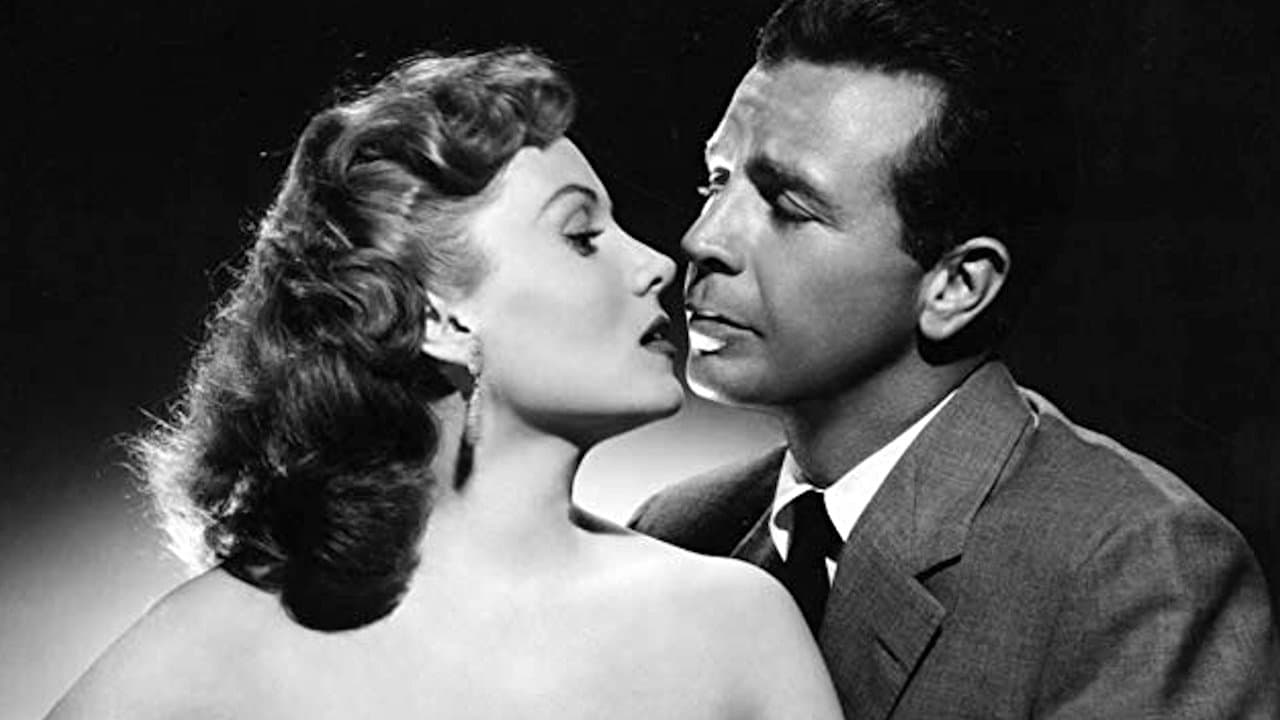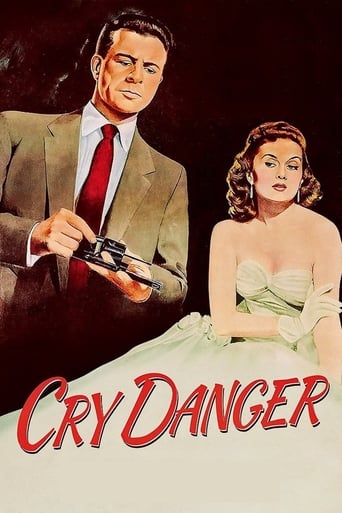

Lack of good storyline.
... View Moreif their story seems completely bonkers, almost like a feverish work of fiction, you ain't heard nothing yet.
... View MoreA lot of perfectly good film show their cards early, establish a unique premise and let the audience explore a topic at a leisurely pace, without much in terms of surprise. this film is not one of those films.
... View MoreVery good movie overall, highly recommended. Most of the negative reviews don't have any merit and are all pollitically based. Give this movie a chance at least, and it might give you a different perspective.
... View MoreDick Powell makes it all make sense and has the ability to carry movie well. He speaks straight to the point, is fearless, can take a beating and there is a part of him when in character that no matter what he does you still like him. That is demonstrated well in this movie. Notice the Los Angeles backdrops capturing sights and sounds from over a half century ago. Good strong supporting cast and remember that the amounts of money talked about in this movie is enough to live comfortably on for the rest of your life in style so apply that thinking when you hear the amounts. did I mention it is a decent thriller/drama? In the fifties, they had a way of getting right to the point regardless of the subject matter. From renting a room, taking a cab or ordering a drink, its done without dragging it out. Also, notice the 4 women portrayed in this movie and how they act out wanting to give themselves over to you if they like you again another trait held over from the 40's and 1950's. Enjoy also seeing how much power the police had. They can detain you or lock you up and everything in between. You don't mistreat them or its curtains to be sure. I also enjoyed that little trailer park in downtown L.A. with the views probably condos today. Hey, sit back, relax and you wont cry danger you just might....
... View MoreEverything about this movie (which was famously filmed in just 22 days) is slick, sharp and punchy. Its story about injustice, revenge and numerous betrayals is told without any unnecessary embellishments, its running time is brief and its dialogue is consistently razor-sharp. With plenty of action, humour and violence, it's gripping right from the start and its relentless pace ensures that audience interest stays at a high level throughout.After serving five years in prison for crimes he didn't commit (robbery and murder), Rocky Mulloy (Dick Powell) is released early from his life sentence when a disabled ex-marine called Delong (Richard Erdman) steps forward with a strong alibi. Detective Lieutenant Gus Cobb (Regis Toomey) who'd originally arrested Mulloy, isn't convinced by Delong's testimony and so puts a round-the-clock tail on Mulloy to test if his cynicism is justified and also to see whether Mulloy leads him to the $100,000 loot from the robbery.It soon emerges that Delong is an opportunist who never knew Mulloy in the past and made up his alibi in the hope that Mulloy would be grateful enough to give him a share of the proceeds of the robbery. After Mulloy explains that he doesn't know where the stolen cash is but is determined to find out, the two men hire a trailer in a local park. Mulloy is out for revenge on whoever framed him and wants to hunt down the real criminals in order to clear his name and also that of his best friend Danny Morgan who's still in prison.Danny's wife (Rhonda Fleming) who was also one of Mulloy's ex-girlfriends, is one of his neighbours at the trailer park and seems interested in reviving their relationship. The determined Mulloy is more focused on other priorities, however, and so goes to visit local crime boss Louie Castro (William Conrad) who he knows was involved in setting up the robbery and demands a payment of $50,000 as compensation for the years he spent in prison. Predictably, Castro doesn't oblige and instead, cleverly sets Mulloy up to be caught in possession of stolen money. Other complications then follow before Mulloy eventually discovers who was responsible for framing him and also where the money from the robbery was hidden.The strongest and most consistent theme that runs through "Cry Danger" is betrayal and the main protagonist's natural bitterness about the circumstances under which he was framed and then lost his liberty for five years is compounded further when, after completing his investigation, he discovers that the extent to which he was betrayed was actually far greater than he ever realised. Dick Powell is convincingly tough, cynical and witty in a performance that makes his shady character very likable and Richard Erdman stands out among the supporting cast who are all extremely good.
... View MoreDick Powell must represent one of the most successful transformations of character in screen history, from light hearted romantic crooner to tough guy. While this little, recently re-discovered film, may be far from one of the best examples, it certainly makes for a good watch.The story by Jerome Cady (A.K.F. Call Northside 777 '48) has many good one liners, and enough twists to keep you hooked till the close. It's unfortunate Cady died at only 45 from an overdose of sleeping pills, taking with him whatever other stories he may have wanted to tell...as well as his own! The Screenplay by William Bowers (A.K.F: The Web '47, Night and Day '46 and Split Second '53) rolls along at a lively pace up to the final scene, that unfortunately, seems to have been either tacked on or hastened by other commitments. The support cast are also good, with William Conrad menacing as the Orson Wells look alike - double crossing partner in crime. Richard Erdman adds a good presence as Delong, a strange opportunist tagging along hoping for a share of missing heist monies. Auburn haired beauty, and trained Soprano, Rhonda Fleming provides adequate feminine interests. Would sure be nice if someday, footage of her traveling Gospel quartet with Jane Russell, might come to light. Ms Fleming also received the Living Legacy award in '95 for her many contributions to women's health issues. Regis Toomey makes a convincing Detective, and his character is intelligently defined. 'Cry Danger' marks the first Directorial effort for Award winning editor Robert Parrish (Body and Soul '47) who went on to direct: Saddle the Wind '58, and Journey to the Far Side of the Sun '69. Prolific Director of Photography: Josef Biroc (It's a Wonderful Life '46, The Detective '69) captures the seedy sets designed by Hungarian Joseph Kish, to the point where you can almost smell the mold and dust on the walls.Paul Dunlap (Walk Like a Dragon '60, and several Samuel Fuller efforts) along with Emil Newman, are credited with the Music Score, but others were also involved, so it comes across as pretty much like a stock Library effort.Not first class Noir, but should please lovers of 50's mystery double features and, any work by Powell is worth watching.
... View MoreThe screenplay of this first rate film noir was written by William Bowers (1916-1987), from an original story by Jerome Cady. We must therefore assume that the fantastic number of gags in this script were from Bowers, unless he hired a team of inspired gag-writers to insert them. Bowers was to enjoy a continued association for some time with both Dick Powell, for whom he wrote SPLIT SECOND (1953), and Robert Parrish, whose ostensible first directorial effort this was. Jean Porter, who appears in this film as Darlene, claimed in an interview in later life that this film was really directed by Dick Powell himself, but that he allowed Robert Parrish to take the credit. Parrish was noted as an editor at that time, but he is not credited as Editor of this film. Instead, Bernard W. Burton, a long-established editor, is credited as 'Editorial Supervisor'. So what happened? With Parrish otherwise uncredited, was he first assistant director or, as is more likely, Editor, with Burton lending his name to cover that category so that Powell could give Parrish his first directorial credit? Powell later did become a director, but there may be reasons why he wanted first to try his spurs anonymously in this fashion. The question of the script is also a mystery worthy of a film noir, because I have never seen a film noir with so many outstanding one-liners, all delivered in a droll and hard-boiled manner by the excellent cast. There are so many of these gags that it sometimes seems as if half of the film's dialogue consists of them, or as if the Marx Brothers had been at work in the back room. From that point of view alone, this film is worthy of classic status, as perhaps the wittiest film noir ever made. But was William Bowers alone really capable of this? Well, never mind, on to other things. Here Dick Powell is perfect for his part: dry, never smiling, never sentimental, determined, and he lacks the annoying and surly jowliness he sometimes showed in other films, such as CORNERED (1945, see my review where I criticize this). Despite his evident lack of any visible sense of humour, Powell delivers his gag lines with impeccable aplomb, as if they were ripe plums dropping from a tree, plop plop plop for 80 minutes non-stop. He never gives the slightest flicker of recognition of the fact that he has just made a witticism. He cracks one-liners like cows eat grass, relentlessly and without stopping for breath. The great surprise performance in this fabulous film is by Richard Erdman, who delivers his one-liners with even greater skill, and even more superb drollery. At first one fears that Erdman is not a very good actor, because he appears to be too natural. Then we realize that he is playing a part where he is not what he at first pretends to be, and that by pretending to be natural he is not being natural, but when he finally does become natural it all comes naturally. As Powell says when asked what it was like having just spent five years in prison on a false charge: 'Five years? You could do that just sitting around.' So they are all so laid back they are horizontal, and some of that takes place too, of both kinds, I mean the kind where the broad is a real knock-out, and the kind where you are knocked out. Yes, there are tough guys around, and William Conrad is a really ominous villain named Castro (no, they don't succeed in killing off this Castro either). The glamour puss is the amazing Rhonda Fleming. Watch out! Rhonda is at it again! She starts out sweet, but we begin bit by bit to realize we have a serious femme fatale here, one who covers her arsenic with marshmallows. Try sucking it and see. She is such a sweetie, just so wonderful, just so loving, but then again, is the heart of her so rotten that she doesn't even know that bad is bad, that crime is crime, that betrayal is well, what's a little betrayal after all when there's real money in it? She's the kind of gal who says 'I love you' in between mental calculations of the share of a robbery, where each kiss is costed out as if by a corporate accountant. Lawyers charge by the hour, but she charges by the second, which sometimes measures just how long people may have to live if they get between her and the dough. But that's film noir!
... View More